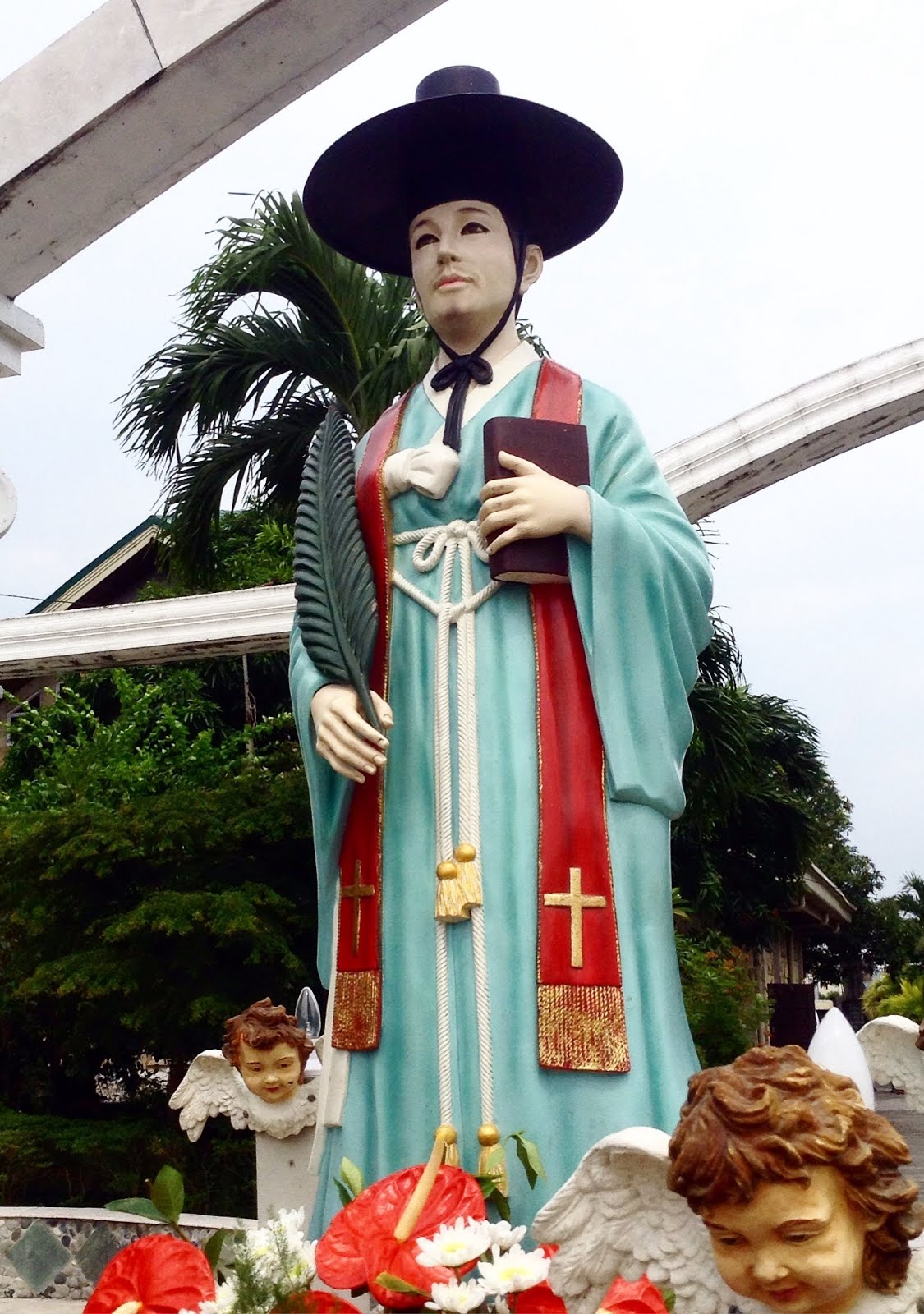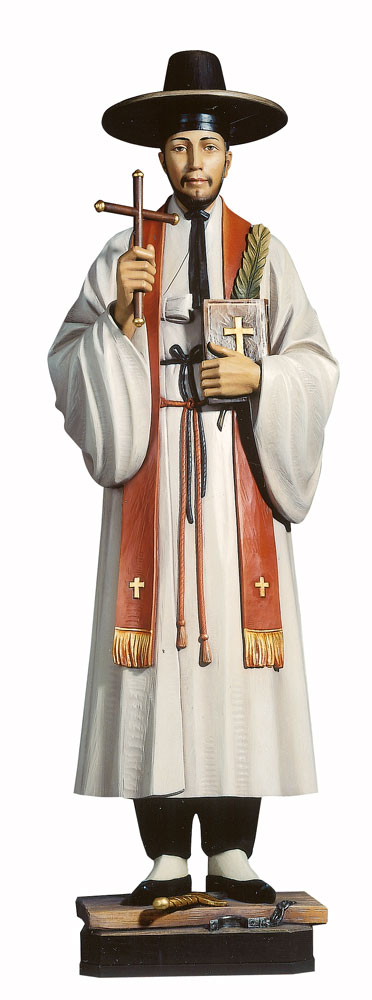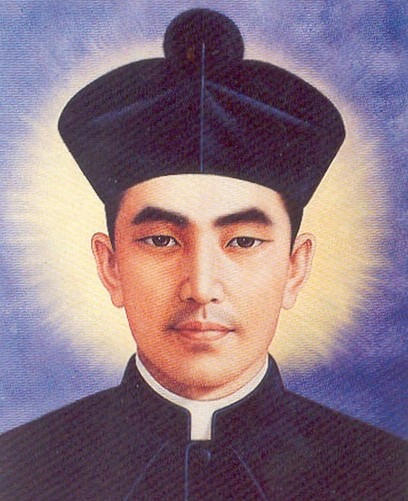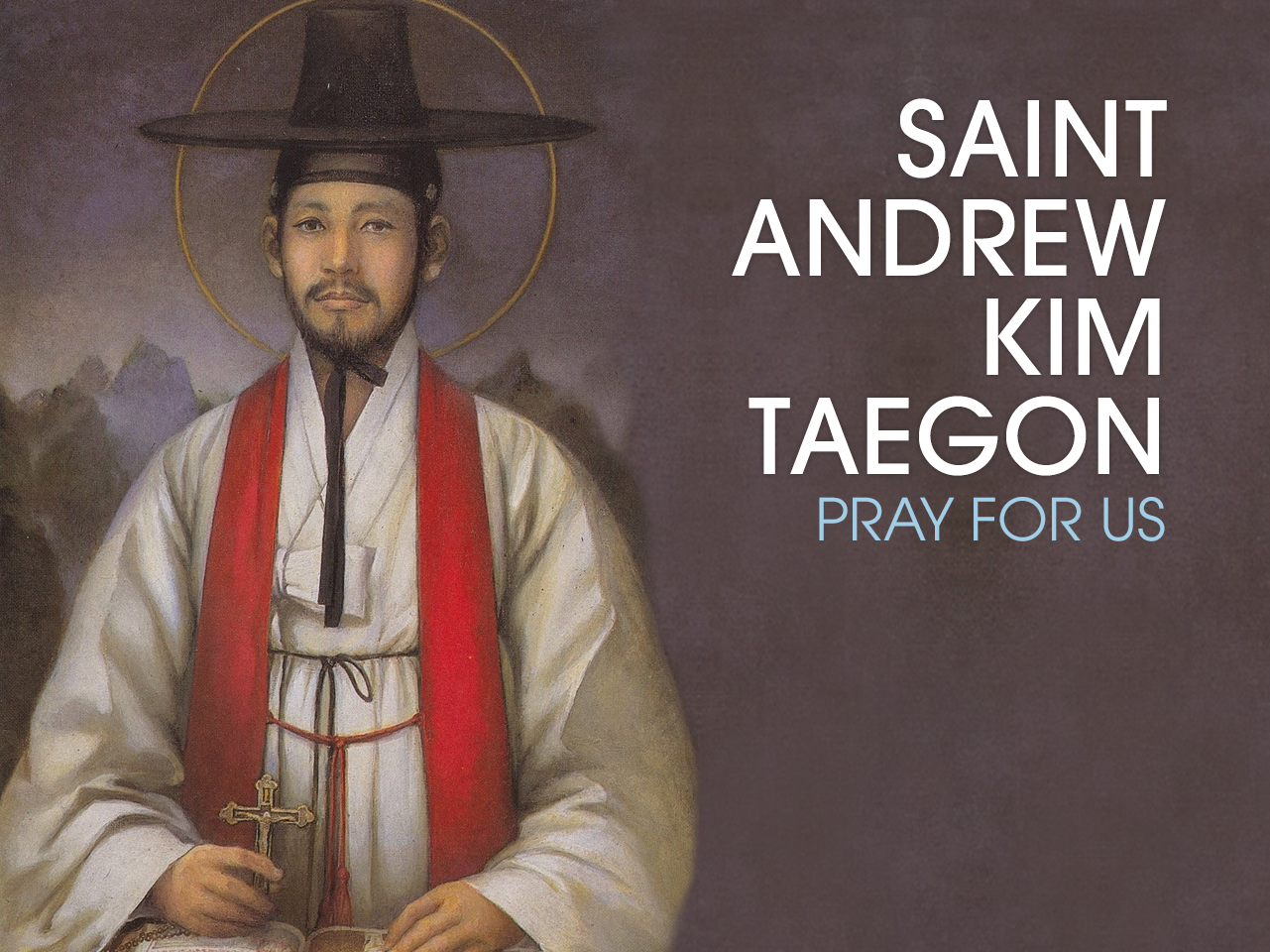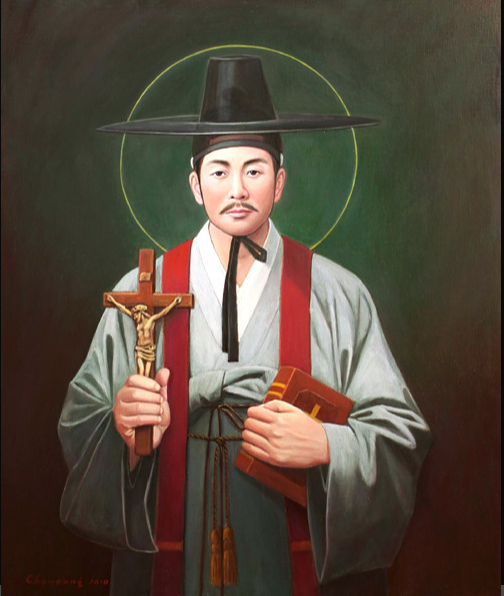
-Choyeung Portrait of St. Andrew Kim Tae-Gon, 김대건 안드레아 신부의 초상화, 75x90cm,Oil on canvas, 2010
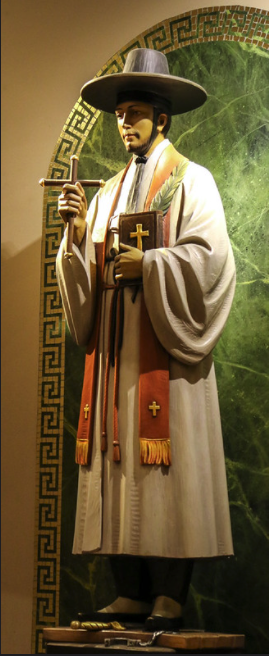
-Franciscan church of St Francis of Assisi in New York
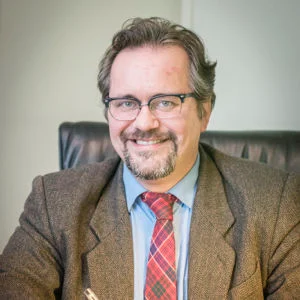
-by Sean Fitzpatrick
“When French missionaries first set foot on Korean soil in 1836, they were not prepared for the surprise that awaited them. There they found thousands of practicing Catholics, living without sacraments and who had never seen a priest before. Among these remarkable faithful, the missionaries would help one young Korean begin his path toward holy orders—one who would, in time, be declared Korea’s first native priest and the canonized patron of the East Asian Peninsula: Andrew Kim Taegon.
In its typically mysterious ways, the Church preceded its apostles in Korea, coming some three hundred years before the Paris Foreign Mission Society at the hands of Japanese invaders, and later, from texts that were brought over by scholars from China. Many Korean people were moved to embrace Jesus Christ wholeheartedly on hearsay and hope alone. It was this extraordinary faith that characterized the early Church in Korea and that animated Korea’s first Catholic priest and saint.
Sign up for Catholic Answers RADIO-REPLIES email question and answer series
Born in Chungchong Province in 1821 to parents who were Catholic converts, Kim Taegon was baptized Andrew at the age of 15, even though his father and grandfather had been put to death for adhering to Christianity. The Korean monarchy was suspicious of this Western faith and its opposition to the nation’s predominant Confucian philosophy. Catholicism was regarded as a sinister colonizing influence, and violent efforts were made to crush it.
Under these circumstances of persecution, the missionary priests sent Andrew with two companions over a thousand miles away to a seminary in Macau, China, to prepare for the priesthood. After years of study, and adventures as an interpreter aboard a French warship, Andrew was ordained a deacon in China. He then made his way back to his fatherland.
From Seoul, Andrew led a number of French missionaries to Shanghai, where the French bishop Jean-Joseph-Jean-Baptiste Ferréol ordained him the first Korean priest. Shining with zeal and fervor at the age of 25, Andrew returned to Korea with Bishop Ferréol himself to bring the gospel and Christ’s salvation to his people. He labored and ministered with joy in his home province of Chungchong until the bishop sent him on to Seoul in an effort to introduce the French missionaries from China into that region, using Chinese fishing boats to smuggle them in.
His mission was discovered by officials of the Joseon Dynasty, whose merciless clampdown on Christianity forced the faithful into hiding, but Andrew was bold in his love for Christ and Christ’s flock. He was taken to prison in Seoul, where he was tortured and finally found guilty of treason in leading a heretical cult into the country. As he awaited the executioner’s blade, Andrew Kim Taegon is reported to have cried out to those who assembled for his beheading,
This is my last hour of life, listen to me attentively: if I have held communication with foreigners, it has been for my religion and my God. It is for him that I die. My immortal life is on the point of beginning. Become Christians if you wish to be happy after death, because God has eternal chastisements in store for those who have refused to know him.
In 1984, Pope St. John Paul II canonized Andrew Kim Taegon together with Paul Chong Hasang, who laid the groundwork for the founding of a diocese in Korea, and 102 Korean martyrs. These valiant companions in Christ celebrate their feast day on September 20.
Today, we are all somewhat accustomed, at least from afar, to the longstanding tensions that entangle North Korea and South Korea and the ripple effects they produce on the world stage. The peculiar isolationism of North Korea, with its overt militaristic bluff and bluster, might be viewed as an extreme and alarming caricature of a certain Oriental self-assurance, arising paradoxically from an Asian privacy that in many, if not most, cases, is an Asian courtesy, given how much of a matter of course it is for a multitude to live in a relatively minute territory.
That attitude of charity in society and forbearance of neighbors is one that makes for good soil for Christianity. On the other hand, the defensive attitude also prevalent in such places challenges the Faith’s taking root. Today, a good deal of saber-rattling may come from Pyongyang, but the sword that Our Lord promised to bring has rattled these nations for centuries beyond any modern missile test. That sacred saber-rattling has awoken many in the East to the sun of righteousness, rising with healing in his wings.
The persecution of Catholics in the history of Asia is not as storied as it deserves to be, hidden perhaps behind that deep Eastern veil of secrecy and sanctity. But there are heroes, valiant soldiers of Christ, whose lives and deaths, though obscure, have built up a foundation of faith that has withstood the brinkmanship and pressures of oppressive dynasties whose motives often appear more calculated toward power than peace.
Christianity now has a home in Korea and, more importantly, in Korean hearts, though their struggles continue to this day. But also to this day, the blessings and bruises of Korean Catholics remain in the hands of their holy patron saint, Andrew Kim Taegon, and his fellow martyrs. As goes the ancient Korean saying, at the end of hardship comes happiness.”
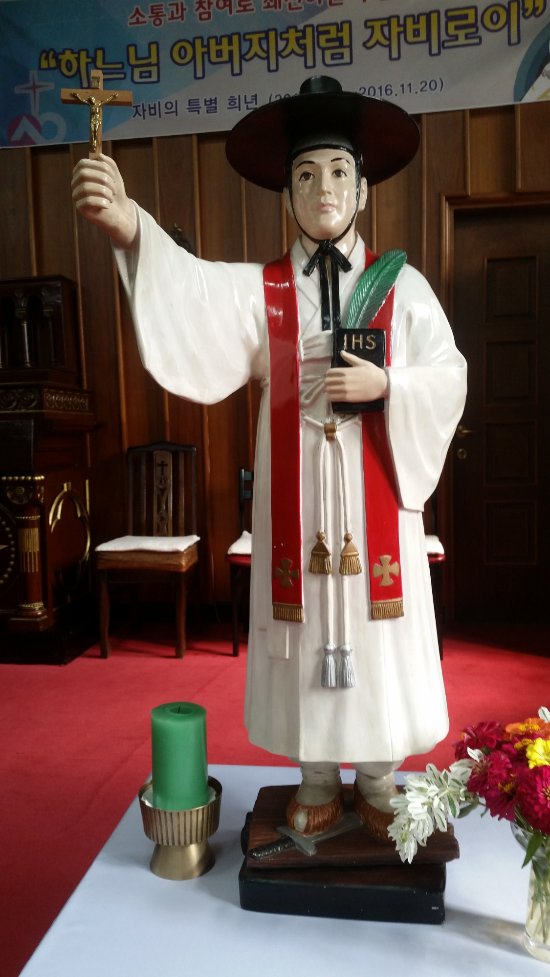
-Mirinae Holy Site, the location of the graves of Saint Andreas Kim Taegon, Korea’s first Catholic priest and saint; his mother Ursula; Bishop Ferréol, the third head of the Joseon parish who ordained Priest Kim; and Vincentius Lee Minsik who buried Saint Kim’s body.
“My Lord, Your Excellency will have already heard what has happened in the capital since we parted. We set sail as soon as we had completed our preparations, and a favourable wind brought us in safety to the sea of Yen-pieng, which was covered at that time by a quantity of fishing boats. My people bought some fish, and went to the harbour of the island of Suney to sell it again, but not finding purchasers, they sent a sailor ashore to salt it.
In the course of our voyage we passed by Pokang, and the islands of Maihap Thetsinmok and Sotseng Taitseng, and at last cast anchor near Pelintao. I saw there about a hundred fishing junks from Canton; they kept very near to the shore, but the crew were prevented from landing by sentinels, who were posted on the elevations of the coast, and the tops of the hills. Curiosity drew a crowd of Coreans from the neighbouring islands round the Chinese. I myself went near them at night, and was able to speak to the master of a boat. I entrusted him with the letters of your Excellency, and wrote some to MM. Beneux, Libois, and Martre, as well as to two Chinese Christians. I added to these two maps of Corea, with a description of the islands, rocks, and other remarkable features of the coast of Hoang-hai. This place appears very favourable for the introduction of missionaries, and for the transmission of letters, provided sufficient precautions are taken in making use of the Chinese. They make an appointment here for the fishing every year, about the beginning of the third month, and remain there till about the end of the fifth.
After having executed your Lordship’s orders, we set out again, and returned to the harbour of Suney. Up to this time my voyage had been very prosperous, and I hoped for an equally fortunate termination of it. The fish which we had left was not yet dried, which obliged us to stay longer in port. My servant Veran asked leave to go on shore to reclaim some money which he had left in charge of a family, with whom he had been concealed for seven years for fear of persecution.
After he had gone the mandarin came to our boat, with some of his people, and asked to be allowed to use it to drive away the Chinese junks. Corean law does not allow the boats of the nobles to be taken for the public service, and as I had been made, I do not know how, to pass with the people for a ianpan of high rank, as the nobles are called, I should have fallen in their estimation, and so done an injury to our future expeditions, if I had given up my boat to the mandarin. Besides, Veran had prescribed for me a line of conduct which I was to pursue in similar circumstances. I therefore replied to the mandarin, that my boat was for my own use, and that I could not give it up to him. His officers abused me violently, and took my pilot away with them.
They came back in the evening, and taking away another sailor, brought him into the court, where the answers which both of them made when questioned, threw grave suspicions upon me. The mandarin was aware that the grandmother of one of them was a Christian. The officers then consulted together, and said: “We are thirty; if this person is really noble, perhaps one or two of us may be put to death, but not all; let us go and seize him.” They accordingly came at night, accompanied by several women of bad character, and throwing themselves upon us like madmen, they dragged me by the hair, some of which was pulled out, and tying me with a cord, they showered kicks and blows with their hands and with sticks upon me. In the mean time the remaining sailors under cover of the darkness of the night crept quietly down into the boat, and rowed away as fast as they could.
When we reached the shore, the officers stripped me of my clothes, bound and beat me again with every sort of insult and sarcasm, and brought me to the court, where a great many persons were assembled. The mandarin said to me: “Are you a Christian?”
“Yes, I am,” I answered.
“Why do you practise this religion contrary to the king’s orders? Give it up.”
“I practice my religion because it is true; it teaches me to know God, and brings me to eternal happiness: I know of no such thing as apostasy.”
The torture was then applied to me, and the judge said, “If you do not apostatise you shall die under the blows.”
“As you please, but I will never abandon my God. Do you wish to hear the truth of my religion? Listen. The God whom I worship is the Creator of heaven and earth, of men and of everything that is: He punishes sin and rewards virtue, &c. Whence it follows that all men are bound to do homage to Him. For my part, I thank thee, O mandarin, for making me suffer these tortures for His love. May my God reward you for this benefit, and raise you to a higher rank.”
At these words the mandarin and the whole assembly began to laugh. They next brought me a cangue about eight feet long, which I immediately took up, and put on my neck, at which bursts of laughter broke from all parts of the audience. I was thrown into prison with the two sailors, who had already apostatised. My hands and feet, my neck and my loins were tightly bound, so that I could neither walk, nor sit, nor lie down. A crowd of people pressed round me out of curiosity, and I spent part of the night in preaching the faith to them, and they declared that they would embrace it if it were not forbidden by the king.
The officers finding some Chinese articles in my bag believed that I was of that country, and the next day the mandarin sent for me and asked if I was a Chinese.
“No,” I answered, “I am a Corean.”
Not believing what I said he asked, “In what province of China were you born?”
“I was brought up in Macao in the province of Koang-tong; I am a Christian, and curiosity and the desire of propagating my religion brought me to this country.”
He then sent me back to prison, from whence, five days later, I was taken by a subaltern and several men to Kaiton, the capital of the province. The governor asked me if I was a Chinese, and I answered as I had done to the mandarin of the island. He put a great many questions to me about my religion, and I gladly took the opportunity of speaking to him of the immortality of the soul, hell, paradise, the existence of God, and the necessity of worshipping Him in order to be happy after death.
He and his people answered, “What you say is good and reasonable: but the king does not allow us to be Christians.” They afterwards asked me many things which would have compromised the Christians and the mission, and I was very careful not to reply to them. “If you do not tell us the truth,” they said angrily, “we will torment you in various ways.”
“Do what you please,” I answered; and running to the instruments of torture I took them up and threw them at the governor’s feet, saying, “See, I am ready, strike me. I do not fear your tortures.”
The officers removed them immediately, and the servants of the mandarin came up to me and said: “It is the custom for every body who speaks to the governor to call himself So-in” (which means fool.) “What are you saying?” I answered, “I am a great nobleman, and know nothing of such an expression.”
Some days afterwards the governor sent for me again, and overwhelmed me with questions about China, sometimes speaking by an interpreter to find out if I was really a Chinese, and ending by ordering me to apostatise. I shrugged my shoulders and smiled to express my pity for him. The two Christians who were arrested with me were overcome by the severity of the torture, and pointed out the house where I had lived in the capital, besides betraying your excellency’s servant, Thomas Ly, his brother Matthew, and several others: they confessed that I had communicated with the Chinese junks, and given some letters to one of them. A detachment of soldiers was immediately sent off to the junks, which brought back the letters to the governor. We were very strictly guarded in separate cells, with four soldiers watching us night and day, and a long cord tied to our loins. The soldiers seeing seven scars which had been left on my breast by the ten leeches which I had put on when I was ill at Macao, declared that I was the Great Bear, and amused themselves by many jokes about it.
As soon as the king heard of our arrest he sent some officers to bring us to the capital: he had been told that I was a Chinese. During the journey we were not bound as we were in prison, but our arms were tied with a red cord, as is done with robbers and great criminals, and our heads were covered with bags of black cloth. We suffered greatly on the way from the crowds, who thought I was a foreigner, and pressed to see me, some even climbing up trees and getting on the roofs of houses as I passed.
When we reached Seoul we were thrown into the prison of thieves. The people of the court, hearing me speak, said I was a Corean. The following day I appeared before the judges, who asked me what I was.
“I am a Corean,” I answered, “and I was educated in China.” Interpreters of Chinese were then called that I might speak with them.
In the persecution of 1839 the person who betrayed us declared that three young Coreans had been sent to Macao to study the language of the Europeans, so that it was impossible that I should not be recognized: besides, one of the Christians who was arrested with me had told them that I was their countryman. I confessed to the judges that I was Andrew Kim, one of the three Coreans mentioned, and I related to them all that I had gone through in order to return to my country.
When I had told my story every one exclaimed, “Poor young man! From his infancy upwards he has been in trouble.”
The judges ordered me to conform to the king’s orders and to apostatise, but I answered, “The God who orders me to worship Him is above the king, and to deny Him is a sin which the king’s order cannot justify.”
When it was suggested to me to denounce the Christians I objected to them the duties of charity and the commandment of God to love our neighbour. Being asked about religion I spoke to them at length of the existence and unity of God, of the creation and immortality of the soul, of hell, of the necessity of worshipping our Creator, and of the falsehood of the religions of the heathen.
When I had finished speaking the judges answered: “Your religion is good, but ours is so also, and therefore we practise it.”
“If such is your opinion,” I replied, “you ought to leave us alone and live at peace with us. But instead of that you persecute us, and treat us worse than the greatest criminals: you confess that our religion is good, and you attack us as if its teaching was abominable.”
They laughed loudly at my reply, and handed to me the letters and papers they had taken. The judges read the two that were written in Chinese; they only contained salutations to friends. They then told me to translate the European letters, but I only explained to them what was of no consequence to the Mission. They asked me about MM. Berneux, Maistre, and Libois, and I answered “esse philosophantes in Sinis,” that they were studying philosophy in China.
Finding a difference between my letters and those of your Excellency they asked me who had written the latter. I said in general that they were my letters. They showed me those of your Excellency, and desired me to write like them, intending to entrap me, but I was too cunning for them. “These characters,” I said, “were written with a metallic pen; if you will bring one I will do as you wish.
“We have no pens of metal.”
“Unless I have one I cannot form characters like these.”
A quill was then brought, and the judge gave it to me saying, ” Cannot you write with this instrument?”
“It is not the same thing, but it will serve to show how a person who uses the European characters can write different hands.” Then making a very fine pen I wrote several lines in a small hand, and afterwards I cut off the point and wrote much larger. “You see,” I said to them, “these characters are not the same.” This satisfied them, and they did not press me further, but your Lordship will see from this how far our learned men in Corea are behind those of Europe.
The Christians who were taken with me have not yet been put to any torture in the capital. Charles and his companions are in another prison, where we cannot communicate with them. Of the ten who are here four have apostatised, but three of them repent of their weakness. Matthias Ly, who played so vile a part in 1839, appears full of courage and desirous of martyrdom, His example is followed by the father of the convert Sensiri, by my pilot, and by Peter Nam, who formerly gave such scandal to the faithful. We do not know when we shall be led out to death, but we are full of confidence in the mercy of the Lord, and trust that He will give us strength to confess His holy Name up to our last moment.
The government has decided upon seizing your Excellency’s servant Thomas, and several other important persons. The police seem rather tired, and not caring to look for Christians any more, have said that they have all gone away to Itsen Iantsi Ogni, and into the provinces of Tshong-tsheng and Tsella. I entreat your Excellency and M. Daveluy to remain concealed until after my death.
The judge tells me that three vessels, believed to be French, have anchored near the island Oiento. He says they have come by order of the Emperor of France, (a convenient expression in these countries,) and that they threaten to do much harm to Corea; that two of them have gone away with the intention of returning next year, and that the third still remains in Corean waters. The government seems frightened, remembering the death of the three Frenchmen who were martyred in 1839. I was asked if I knew the reason of their coming, and I replied that I knew nothing about it, but that they need not be afraid, for that the French never did harm to any one without good reason. I have spoken to them of the power of France, and of the liberality of her government. I think they believe me, but they object to me that they have killed three Frenchmen without coming to any harm. If French ships have really come to Corea, your Excellency will doubtless be aware of it.
I have had to translate an English map of the world, and have made two copies of it in colours, which have pleased them much; one is intended for the king. Just now I am engaged, by order of the ministers, in making a small compendium of geography. They take me for a very learned man. Poor people!
I recommend Ursula, my mother, to your Excellency. She was allowed to see her son for a day or two after an absence of ten years, and then he was taken from her again. Have pity upon her, I beseech you, and console her in her sorrow.
Prostrating myself in spirit at your Excellency’s feet, I salute for the last time my beloved father and revered bishop. I likewise salute Mgr. De Besi, and send my respectful compliments to M. Daveluy.
May we meet in heaven.
From prison, 26th August, 1846,
-Andrew Kim, Priest, Prisoner of Jesus Christ” (beheaded on September 16, 1846, Seoul, Korea), Letter of Saint Andrew Kim Taegon (martyr) to Bishop Jean Joseph Ferréo
“I urge you to remain steadfast in faith, so that at last we will all reach heaven and there rejoice together.”
–St. Andrew Kim Taegon
““We have received baptism, entrance into the Church and the honor of being called Christians. Yet what good will this do us if we are Christians in name only and not in fact?” -St Andrew Kim Taegon
“This is my last hour of life, listen to me attentively: if I have held communication with foreigners, it has been for my religion and for my God. It is for Him that I die. My immortal life is on the point of beginning. Become Christians if you wish to be happy after death, because God has eternal chastisements in store for those who have refused to know Him.” -final words of St Andrew Kim Taegon
“O God, Who have been pleased to increase your adopted children in all the world, and Who made the blood of the Martyrs Saint Andrew Kim Tae-gon and his companions a most fruitful seed of Christians, grant that we may be defended by their help and profit always from their example. Through our Lord Jesus Christ, your Son, Who lives and reigns with You in the unity of the Holy Spirit, One God, for ever and ever. Amen.”
–Collect for the feast of the Martyrs of Korea.
사랑 해요, salang haeyo,
Matthew

